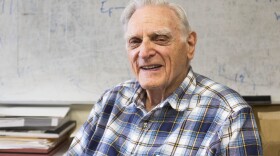Researchers from Rensselaer Polytechnic Institute are working on developing what they hope will be a greener, more efficient, and less expensive energy storage alternative to lithium batteries.
Lithium batteries can be found in everything from smartphones to laptops to electric bikes and cars. But concerns about scarcity, high prices, and safety regarding their long-term use has led researchers to pursue a more cost-efficient and cheaper way to store energy.
Nikhil Koratkar, an RPI engineering professor, and his team believe calcium ions can replace costly lithium-ions in batteries because of calcium's abundance and low cost.
Koratkar says earth's supply of lithium is finite.
"And eventually, there won't be any lithium left on the planet, and we're going to have to shift to something else," Koratkar said. "Exactly when that is going to happen, it's not clear. Some people say 20 years, some people say 50 years. And recycling of lithium is not easy, because the way the batteries are being made right now, it's very difficult to disassemble the battery and to extract out the lithium. That process itself requires a lot of energy. And you also have various dangerous gases that escape in that process. So I don't see recycling of lithium as the being possible in the long run."
Koratkar spent several years trying to improve lithium batteries before searching for an alternative. He says the biggest challenge involves working with the larger size and higher charge density of calcium ions relative to lithium.
"There's a very important requirement in batteries that not only do you want to store a lot of charge, you also want to be able to charge at high rates," said Koratkar. "We made a complex metal oxide cathode that is outstanding at being able to take in calcium, and also as being able to transport calcium at high speed inside the cathode. That's half the battery. We still need to create a low voltage anode that can be paired with this high voltage cathode. And at this point, you know, we solved half the problem at this stage. But we still need to discover a low voltage anode material, that would really complete the battery."
Koratkar says when they figure that out, calcium-based batteries that use abundant, safe materials will be both affordable and sustainable.
"Because I think lithium ion technology is going to definitely go strong for the next I would say 10 or 20 years," said Koratkar. "It's going to run out of steam only when the cost starts to go up. And I think that will happen naturally as the amount of lithium on the planet shrinks."
Koratkar and his research team continue to explore alternatives to lithium, intent on getting the calcium ion battery to charge faster than a lithium ion battery. Koratkar says while he has interacted with companies like Tesla, they are not yet interested in migrating away from lithium ion technology.





